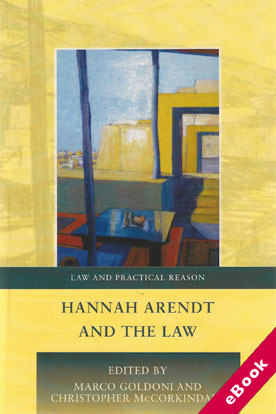
The device(s) you use to access the eBook content must be authorized with an Adobe ID before you download the product otherwise it will fail to register correctly.
For further information see https://www.wildy.com/ebook-formats
Once the order is confirmed an automated e-mail will be sent to you to allow you to download the eBook.
All eBooks are supplied firm sale and cannot be returned. If you believe there is a fault with your eBook then contact us on ebooks@wildy.com and we will help in resolving the issue. This does not affect your statutory rights.
This book fills a major gap in the ever-increasing secondary literature on Hannah Arendt's political thought by providing a dedicated and coherent treatment of the many, various and interesting things which Arendt had to say about law.
Often obscured by more pressing or more controversial aspects of her work, Arendt nonetheless had interesting insights into Greek and Roman concepts of law, human rights, constitutional design, legislation, sovereignty, international tribunals, judicial review and much more.
This book retrieves these aspects of her legal philosophy for the attention of both Arendt scholars and lawyers alike. The book brings together lawyers as well as Arendt scholars drawn from a range of disciplines (philosophy, political science, international relations), who have engaged in an internal debate the dynamism of which is captured in print.
Following the editors' introduction, the book is split into four Parts: Part I explores the concept of law in Arendt's thought; Part II explores legal aspects of Arendt's constitutional thought: first locating Arendt in the wider tradition of republican constitutionalism, before turning attention to the role of courts and the role of parliament in her constitutional design.
In Part III Arendt's thought on international law is explored from a variety of perspectives, covering international institutions and international criminal law, as well as the theoretical foundations of international law. Part IV debates the foundations, content and meaning of Arendt's famous and influential claim that the 'right to have rights' is the one true human right.